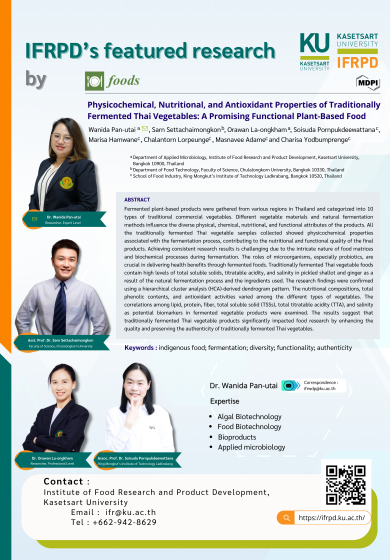| ผลงานวิจัย | ดร.วนิดา ปานอุทัย และคณะ |
| Keywords | indigenous food; fermentation; diversity; functionality; authenticity |
| Telephone | 0 2942 8629 (1402) |
| ifrwdp@ku.ac.th | |
| URL | https://doi.org/10.3390/foods13172848 |


Physicochemical, Nutritional, and Antioxidant Properties of Traditionally Fermented Thai Vegetables: A Promising Functional Plant-Based Food

| ผลงานวิจัย | ดร.วนิดา ปานอุทัย และคณะ |
| Keywords | indigenous food; fermentation; diversity; functionality; authenticity |
| Telephone | 0 2942 8629 (1402) |
| ifrwdp@ku.ac.th | |
| URL | https://doi.org/10.3390/foods13172848 |
จุดเด่นผลงาน
บทสรุป : ผลิตภัณฑ์อาหารหมักจากพืชพื้นบ้านที่เก็บรวบรวมจากทุกภูมิภาคในประเทศไทย สามารถจำแนกได้ 10 ชนิดหลัก โดยชนิดของพืชพื้นบ้านที่แตกต่างกันร่วมกับวิธีการหมักตามธรรมชาติ ส่งผลต่อคุณสมบัติทางเคมีและกายภาพ คุณค่าทางอาหาร และคุณสมบัติเชิงหน้าที่ของผลิตภัณฑ์อาหารหมักจากพืชพื้นบ้านที่น่าสนใจ
Abstract : Fermented plant-based products were gathered from various regions in Thailand and categorized into 10 types of traditional commercial vegetables. Different vegetable materials and natural fermentation methods influence the diverse physical, chemical, nutritional, and functional attributes of the products. All the traditionally fermented Thai vegetable samples collected showed physicochemical properties associated with the fermentation process, contributing to the nutritional and functional quality of the final products. Achieving consistent research results is challenging due to the intricate nature of food matrices and biochemical processes during fermentation. The roles of microorganisms, especially probiotics, are crucial in delivering health benefits through fermented foods. Traditionally fermented Thai vegetable foods contain high levels of total soluble solids, titratable acidity, and salinity in pickled shallot and ginger as a result of the natural fermentation process and the ingredients used. The research findings were confirmed using a hierarchical cluster analysis (HCA)-derived dendrogram pattern. The nutritional compositions, total phenolic contents, and antioxidant activities varied among the different types of vegetables. The correlations among lipid, protein, fiber, total soluble solid (TSSs), total titratable acidity (TTA), and salinity as potential biomarkers in fermented vegetable products were examined. The results suggest that traditionally fermented Thai vegetable products significantly impacted food research by enhancing the quality and preserving the authenticity of traditionally fermented Thai vegetables.
Foods 2024, 13(17), 2848